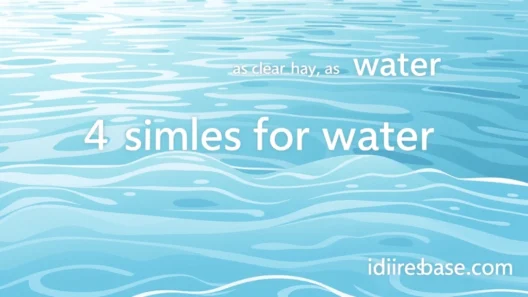Have you ever found yourself searching for just the right words to describe something incredibly soft? It’s a common challenge! The English language is rich and wonderful, but sometimes, "soft" just doesn't quite capture the full sensory experience. It's more than just a texture; it's a feeling, a comfort, a gentle touch.
Imagine trying to paint a vivid picture with words. Saying "the blanket was soft" is okay, but "the blanket was as soft as a cloud" instantly elevates the description, right? That’s the magic of similes! They allow us to compare one thing to another, creating a more relatable and evocative image in the reader's mind. Whether you're a writer, a poet, or just someone who loves to play with words, having a collection of similes for "soft" in your toolkit can truly transform your descriptions. Let's dive into a world of softness and discover 40 delightful similes that will make your language sing!
The Wonderful World of Softness: 40 Similes to Elevate Your Descriptions
Ready to expand your vocabulary and paint more vivid pictures? Here are 40 fantastic similes for "soft," categorized for your convenience.
Similes Inspired by Nature
Nature offers an abundance of softness, from gentle breezes to fluffy clouds.
- As soft as a cloud: A classic for a reason! Evokes images of fluffy, weightless comfort.
- As soft as a feather: Perfect for something light and delicate.
- As soft as moss: Suggests a velvety, natural feel, often damp and cool.
- As soft as a lamb's wool: Implies natural warmth and a gentle, comforting texture.
- As soft as a kitten's fur: Conveys extreme tenderness and a delicate touch.
- As soft as a summer breeze: Describes a gentle, almost imperceptible softness, like a caress.
- As soft as a flower petal: Highlights delicacy and a smooth, tender surface.
- As soft as freshly fallen snow: Suggests a pristine, yielding, and silent softness.
- As soft as a dewdrop: For something incredibly delicate and almost liquid in its gentle touch.
- As soft as a spider's web: Implies extreme delicacy and a barely-there sensation.
Similes for Ultimate Comfort
When you want to describe something that feels like a warm hug or a cozy embrace.
- As soft as a baby's skin: The epitome of smooth, tender, and unblemished softness.
- As soft as velvet: A luxurious, rich, and deeply comforting texture.
- As soft as silk: Synonymous with smoothness, elegance, and a gentle glide.
- As soft as a down pillow: Evokes images of sinking into ultimate comfort and support.
- As soft as a well-worn blanket: Suggests familiarity, warmth, and cherished comfort.
- As soft as a cashmere sweater: Implies high quality, warmth, and exquisite tenderness.
- As soft as a hug: A beautiful way to describe a feeling of emotional and physical comfort.
- As soft as a lullaby: For a gentle, soothing, and comforting sound or presence.
- As soft as a warm bath: Evokes relaxation, ease, and a gentle enveloping sensation.
- As soft as a purring cat: Describes a vibrating, comforting, and deeply soothing softness.
Similes for Delicate and Gentle Things

Sometimes "soft" means fragile, tender, or easily moved.
- As soft as a whisper: For something almost imperceptible, gentle, and quiet.
- As soft as a sigh: Suggests a gentle release, a quiet, tender exhalation.
- As soft as a shadow: Implies a subtle, non-intrusive, and gentle presence.
- As soft as a dream: For something ethereal, gentle, and perhaps a little elusive.
- As soft as a butterfly's wing: Signifies extreme fragility and delicate beauty.
- As soft as a breath: For something incredibly light and barely there.
- As soft as a tear: Suggests vulnerability, gentleness, and a tender emotion.
- As soft as moonlight: Describes a gentle, diffused, and soothing glow.
- As soft as a memory: For something cherished, gentle, and perhaps a little bittersweet.
- As soft as a gentle rain: Evokes a soothing, light, and comforting sensation.
Similes for Unexpected Softness
These similes add a touch of surprise or novelty to your descriptions.
- As soft as a marshmallow: Describes a unique, spongy, and yielding sweetness.
- As soft as newly baked bread: Suggests a warm, yielding, and comforting texture.
- As soft as melted butter: Implies extreme smoothness and a rich, yielding quality.
- As soft as a sponge: For something absorbent and easily compressed.
- As soft as pudding: Describes a smooth, creamy, and easily yielding texture.
- As soft as a freshly laundered sheet: Evokes cleanliness, crispness, and comforting smoothness.
- As soft as a peeled grape: For something surprisingly smooth and yielding beneath a delicate skin.
- As soft as a baby's bottom: A humorous yet accurate way to describe ultimate smoothness and tenderness.
- As soft as modeling clay: Suggests malleability and a consistent, pliable softness.
- As soft as a cloud of cotton candy: Evokes an incredibly light, airy, and dissolving sweetness.
Why Use Similes? The Power of Comparison

You might be thinking, "Why bother with all these comparisons?" Well, similes are super powerful tools for a few key reasons:
- They Create Vivid Imagery: Instead of just telling someone something is soft, you show them. "Soft as a cloud" immediately brings a picture to mind.
- They Engage the Senses: Similes often appeal to more than just sight. "Soft as a lullaby" engages hearing, while "soft as a warm bath" evokes touch and comfort.
- They Add Emotion and Depth: Comparing something to a "baby's skin" or a "well-worn blanket" adds layers of tenderness, comfort, and even nostalgia.
- They Make Your Writing Memorable: Unique and well-chosen similes stick with the reader long after they've finished reading.
- They Enhance SEO: By using descriptive language and varied vocabulary, you naturally create richer content that search engines appreciate. People often search for more specific descriptions, and similes help you provide them!
Key Takeaways
- Similes are powerful literary devices that compare two unlike things using "like" or "as" to create vivid descriptions.
- Using similes for "soft" allows you to convey different nuances of softness, from delicate to comforting to unexpected.
- They enhance readability, engage the reader's senses, and make your writing more memorable and impactful.
- A rich vocabulary, including a good grasp of similes, is essential for compelling content creation.
Frequently Asked Questions
Q1: What is the difference between a simile and a metaphor?

A1: This is a great question! Both similes and metaphors are figures of speech that make comparisons. The key difference is that a simile directly compares two different things using the words "like" or "as." For example, "The blanket was as soft as a cloud." A metaphor, on the other hand, states that one thing is another without using "like" or "as." It creates a direct equivalence. For example, "The cloud was a soft blanket in the sky." So, similes say something is like something else, while metaphors say something is something else.
Q2: How can using similes improve my writing for a global audience?
A2: Using similes can significantly improve your writing for a global audience by making your content more engaging and universally understandable. While some cultural references might be tricky, many similes, especially those rooted in common natural phenomena or human experiences (like "as soft as a feather" or "as soft as a baby's skin"), are widely recognized. They help to paint a clearer picture, transcend language barriers through imagery, and add a layer of sophistication and artistry to your text that resonates with readers worldwide. They make abstract ideas more concrete.
Q3: Are there any common mistakes to avoid when using similes?
A3: Absolutely! While similes are fantastic, it's easy to fall into a few traps. First, avoid clichés where possible. "As busy as a bee" or "as strong as an ox" are common, but they don't always add much freshness. Try to come up with original comparisons. Second, make sure your simile is relevant and adds value. Don't just throw one in for the sake of it; it should enhance the description. Third, ensure the comparison makes logical sense within your context. A simile should clarify, not confuse. Finally, don't overuse them. Too many similes can make your writing feel forced or cluttered. Use them strategically for maximum impact.
Q4: Can similes be used in SEO-optimized content? How?
A4: Yes, absolutely! Similes are not just for poetry; they can be very beneficial for SEO-optimized content. While you don't stuff keywords into similes, their use contributes to overall content quality in several ways. They increase the richness and depth of your vocabulary, which search engines appreciate as a sign of high-quality content. By making your content more engaging and readable, similes can improve user experience metrics like time on page and reduce bounce rate, signaling to search engines that your content is valuable. They also help you explore a topic from different angles, naturally incorporating related keywords and long-tail phrases that people might search for (e.g., instead of just "soft fabric," you might describe "fabric as soft as cashmere," hitting more specific search terms).
Q5: How do I choose the best simile for a specific context?
A5: Choosing the best simile involves a bit of art and a bit of strategy! First, consider the exact nuance of softness you want to convey. Is it delicate, comforting, yielding, or luxurious? Second, think about the object or subject you are describing. A blanket might be "as soft as a cloud," but a whisper might be "as soft as a sigh." Third, consider the tone and mood of your writing. A humorous piece might use "as soft as a baby's bottom," while a more serious one might prefer "as soft as a flower petal." Finally, read it aloud! Does it flow well? Does it sound natural? The best simile will feel just right in its place.
There you have it! A treasure trove of similes to help you describe "soft" in countless captivating ways. So go ahead, experiment, play with words, and let your descriptions truly embrace the gentle magic of softness!





